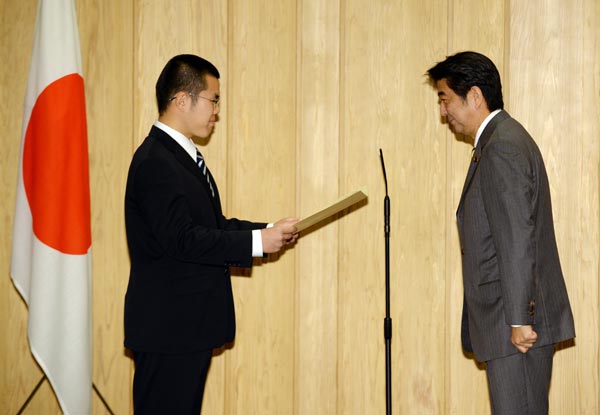|
 |
|
Shanghai-born Yan Jun (left), 26, receives a certificate of appreciation from Japanese Prime Minister Shinzo Abe in Tokyo on Wednesday. Yan was honored for his rescue of a 9-year-old boy from a typhoon-swollen river in Osaka on Sept 16. [Photo/Agencies] |
Yan Jun, a 26-year-old Chinese student majoring in economics in Osaka, has melted the hearts of some Japanese people, if not the ice of bilateral relations. His story is unusually good news amid the strained ties.
After risking his life to save a nine-year-old Japanese boy who was drowning in Osaka on Sept 16, Yan was presented with a certificate of gratitude by Japanese Prime Minister Shinzo Abe at his official residence in Tokyo on Wednesday.
Receiving Yan at the Imperial Palace, Japanese Emperor Akihito also praised the young Chinese student for his bravery.
While a crowd waited on the bank for professional rescuers, Yan plunged into a flooded river in Osaka — twice — to rescue the boy, who was floundering in the water, shouting and screaming.
"I knew that I could make it the second time I jumped into the water," Yan said, after the award ceremony.
He has been treated as a hero by his Japanese neighbors, friends and even strangers in Osaka. A local businessman told Yan that his brave deed had changed his impression of Chinese people.
Previously, people in the two countries had been demonstrating their aversion to each other. China-Japan relations have been in a stalemate since the Japanese government illegally "nationalized" China’s Diaoyu Islands in September 2012.
A total of 92.8 percent of Japanese people have a bad or relatively bad impression of China, while 90.1 percent of Chinese have similar feelings towards Japan, according to the June-July poll by China Daily and the Japanese think-tank Genron NPO. It is the worst picture in almost a decade.
The number of Japanese who visited China in the first six months of this year fell 25.5 percent from the previous year to 1,399,200, according to China’s National Tourism Administration. Meanwhile, Japan is looking to Southeast Asia to offset the drop in Chinese tourists. It is stepping up its efforts to invigorate its tourism industry by offering visa exemptions to visitors from Thailand, Malaysia and Indonesia, and issuing multiple entry visas for visitors from Vietnam, the Philippines and Indonesia.
The mutual distrust of the Chinese and Japanese, however, should not necessarily mean that they do not want to know each other. As a matter of fact, young Chinese people have a strong interest in Japanese idols, such as boy bands and girl singers.
Shanghai launched SNH48, a Chinese version of Japan’s popular idol group AKB48 in December in the aftermath of the widespread protest against the Japanese government’s nationalization of the Diaoyu Islands.
Businesspeople are also interested in, or to be more exact, eager for a thaw in the relationship between China and Japan.
The Japan-China Economic Association, one of seven groups promoting friendship, will send a 100-member mission to China for four days on Nov 18. Members of the mission will include Masahiro Yonekura, chairman of Keidanren, and Takashi Imai, honorary chairman of Nippon Steel & Sumitomo Metal Corp.
In an interview with Japan’s Jiji Press, Fujio Cho, chairman of the Japan-China Economic Association and honorary chairman of Toyota Motor Corp, called attention to a Chinese joint venture by Toyota. He said Japanese and Chinese workers there have become friends and built solid relations after making efforts toward a common goal.
The apparently icy relationship between China and Japan shows no sign of getting warmer soon. A friendly relationship cultivated by the former leaders of the two countries has not reduced the deep mistrust between the two.
The way Chinese and Japanese individuals perceive each other has always resembled a roller coaster ride.
The two countries are still on a learning curve to explore how not to allow difficult issues to hinder the development of their wider relationship. First of all, they need to defrost bilateral relations.
|
|
|
|
|
|
|
|
